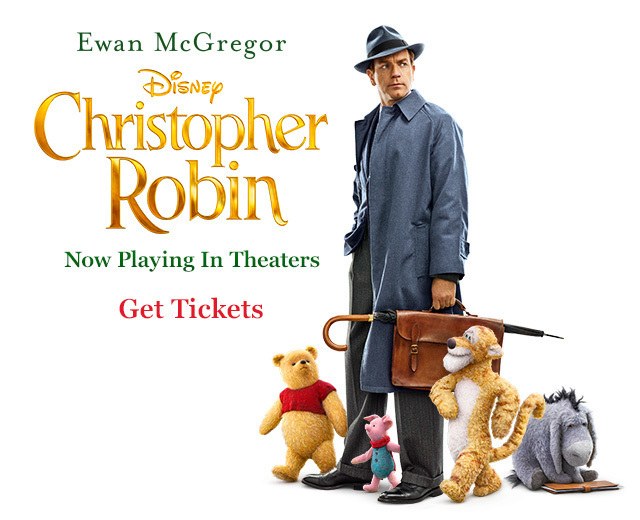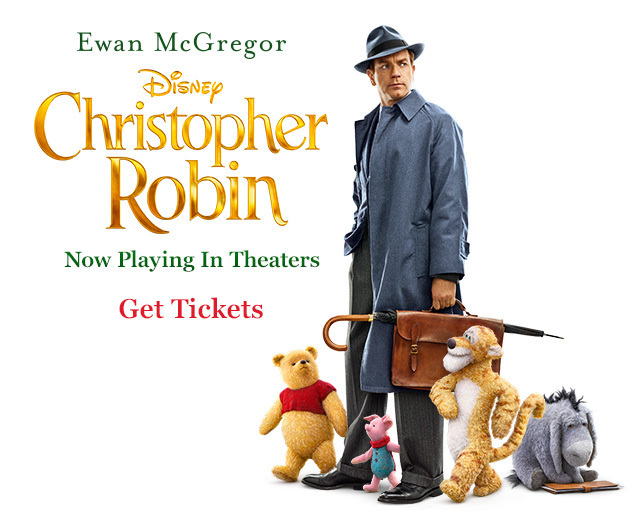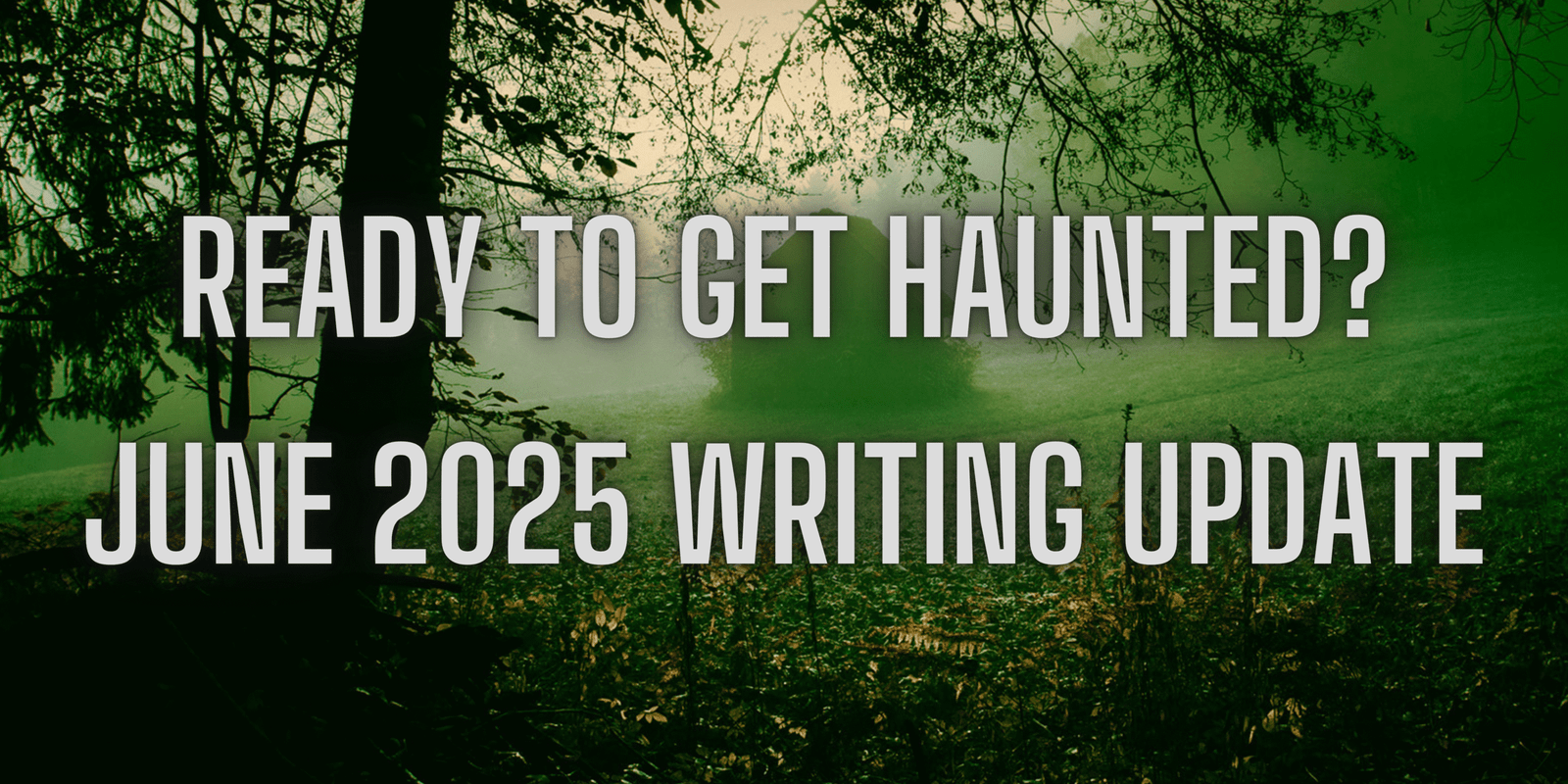I knew from the moment I saw the first trailer for Christopher Robin that this movie would make me cry. If the trailer got me that teary-eyed I was sure the movie itself would wreak havoc on my emotions. I made sure to wear absolutely no makeup on the day I saw the film in theatres because otherwise I probably would have ended up looking a little like Alice Cooper. The verdict: I was crying before the movie began. In the theatre, trailers were shown for the new Marry Poppins Returns and Dumbo so my eyes were definitely starting to water before the actual movie even started. And, of course, I cried a lot more during the feature film.

I would have to say that the one element that really hit me when I least expected was the music. The score of the film was about on par for what one would expect from a Disney film, but there was a little something extra woven into the soundtrack. The original Winnie the Pooh theme was subtly played throughout many of the pieces of music throughout the film. At times, this theme song was more noticeable and was very much at the forefront of a particular piece of music, but occasionally it was incorporated so subtly and so seamlessly that I didn’t always notice it right away. This was definitely a nice touch that made me smile (and cry) throughout the film.
In fact, the film itself was really well executed in that it incorporated references to previous incarnations of the Winnie the Pooh franchise that some audience members would be familiar with. Not only was the theme music present, but the opening titles and any transitional sequences were set up to look like the original Winnie the Pooh books. There were event little moments in the story itself – tossing the twigs off of the bridge is one that comes to mind – that didn’t necessarily add anything particular to the plot of the film, but reminded Winnie the Pooh fans of some of the past stories about this silly old bear. And, of course, the constant search for honey is a must in any Winnie the Pooh story.
Small details aside, the overall plot was rather creative as it was clearly crafted to appeal to both adults and children. This desire to appeal to two different generations means that the film has ended up with two parallel story lines: the main plot features an adult protagonist and themes for the adults in the audience, and the secondary plot features a little girl undertaking a more child-like adventure for the viewing pleasure of the younger audience members. Of course, the protagonists were Christopher Robin (Ewan McGregor) for the adults who are familiar with Winnie the Pooh and equally familiar with the issues one may face in adulthood, and Madeline Robin (Bronte Carmichael) for the children in the audience who have yet to experience either the world of this honey-loving bear or the seemingly daunting world of adults. Because of this, the major themes of the plot appeared both simple and complex.
My boyfriend and I ended up seeing the film with the child of our friends, and she clearly enjoyed the more childlike moments of the film. Not only does this apply to the scenes featuring a child protagonist, but to any scenes involving Winnie the Pooh (Jim Cummings) and his friends. I got the sense that it was the more adult moments of the film that did not quite attract her attention in the same way. Those were some of the moments that made me cry the most because Christopher Robin transitions from child to adult through a series of potentially traumatic events – moving to a boarding school, having to cope with the loss of his father, going away to fight in the war, and returning to a daughter he does not know and who does not know him. He became an adult because of hardships in his life, and as an adult we watch him stumble his way through life, trying to live as he was taught to by other adults. He is no longer the young Christopher Robin we saw at the beginning of the film, but an imitation of the other adults around him as he attempts to find his place in this adult world. And I think that’s what’s so sad about his predicament: he’s not necessarily doing anything wrong, but he doesn’t exactly know how to do things right. If I could compare him to another Disney father figure, it would be Mr. Banks – he is doing his best in the only way he knows how, but his best isn’t actually the best option for his family.
For both protagonists, Christopher Robin and his daughter Madeline, the presence of Winnie the Pooh and the other inhabitants of the Hundred Acre Wood signifies a need to reclaim their childhood before their relationship completely deteriorates. Since Christopher Robin has grown up by learning to imitate the adults around him, he is under the impression that his daughter must do the same if she is to become a successful adult. But it is only when his little girl is given the chance to actually enjoy her childhood, and when Christopher Robin remembers his own childhood, that the family finally has a chance at happiness. In order to be the best adult he can be, Christopher Robin needs to embrace not only his adult self, but his childhood self as well. He needs to embrace a bit of his old imaginative self, rather than relying solely on the version of himself that other adults impressed upon him, in order to be a truly great husband, father, and employee.
Ending on a more personal note: my adult side was deeply moved by Christopher Robin’s struggles, my child side adored Winnie the Pooh and reveled in the flood of childhood memories brought on my this film, and my geeky side loved the fact that Peter Capaldi provided the voice for Rabbit.



